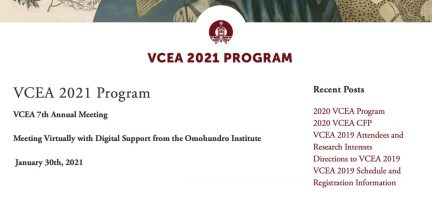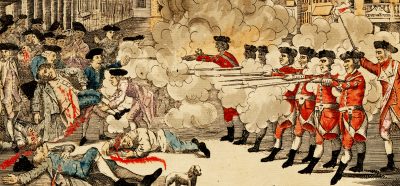
On January 30, 2021, the Virginia Consortium of Early Americanists held their seventh annual conference. I had never attended one before. I do receive the notices of the event and other history-related conferences in Virginia. While many of them seem interesting there is a cost factor in time and money given the other conferences I attend. The last conference I attended in person was in March in Manhattan. My travel expenses since then have been zero. In addition, I have had the opportunity to attend multiple conferences and talks that I otherwise would not have attended if they hadn’t been online and often free. For that matter, some of them never would have been held in the first place save for the online nature of the event. For the host organization, there are comparatively limited scheduling issues now and no travel or food expense either.
Of course, by now, many people are zoomed out. The explosion of such events can become even more time consuming. Still there is the opportunity to pick and choose including walking away from the computer when enough is enough.
With this background in mind, I turn to the session in Virginia that did grab my attention:
Keynote: A Conversation with Fran Bradford, Deputy Secretary of Education for the
Commonwealth of Virginia about Virginia’s 250th Commemoration of American Independence
During this time of America’s Third Civil War, the challenges of the 250th commemoration (celebration) of the birthday of the country have not yet been fully realized. The presentation by the Commonwealth of Virginia provided an opportunity to address multiple facets of these challenges from a logistical, organizational, and ideological perspective.
First, the speaker was from the state government and appears to have a significant position. I don’t know how many “Deputy Secretary” positions there are, but it sounds like an important job title. By comparison in New York, the Deputy Commissioner of Education has not participated in any of the 250th anniversary meetings I have attended so far. True, I don’t know what has happened behind the scenes. So far at least, the public face of the 250th has been the State Historian. No disrespect Devin, but the positions are not comparable.
ISSUE #1 AT THIS POINT IN TIME, WHO IS THE STATE GOVERNMENT FACE OF THE 250TH ANNIVERSARY IN YOUR STATE? IS THERE ONE? IF THERE IS ONE, WHAT IS THE STATURE OF THE POSITION WITHIN THE GOVERNMENT HIERARCHY?
Second, during Bradford’s presentation, she mentioned some private history organizations in Virginia. These are the heavy hitters. They are the organizations with the movers and shakers on their boards, the connections to the state government, and who can generate funding. In the Q&A portion, the topic was raised about the smaller organizations that do not have the full-time staff, expertise, and access even to know about the various funding opportunities and assistance available or how to apply for them. Bradford made a note to bring the subject at the next meeting.
Every state has its own story to tell. In this regard, the situation in New York State is dire, has been for years, and shows no meaningful signs of improvement. The topic has been the subject of multiple blogs particularly related to the defunct New York State Historical Association (NYSHA) leaving the state without a statewide history advocacy organization:
History Professors Protest for Local and State History (November 26, 2017)
NYSHA Responds to Advocacy for Local and State History Post (November 30, 2017)
The NYSHA Saga Continues: Gone but Not Forgotten (December 7, 2017)
Save the History Community: Clone Erika Sanger (December 18, 2017)
The Battle over New York State and Local History Gets Ugly (January 19, 2018)
Create the New York Association for State and Local History (NYASLH) (February 1, 2019).
Despite the efforts of such heavyweights as Ken Jackson and the New York Academy, there has been no real change in the situation in New York. The Museum Association of New York (MANY) led by the aforementioned Erika Sanger has tried to fill some of the void but the organization’s mandate is museums which is not exactly the same thing as history. In Westchester County where I live, a private group has created a non-profit 501(c)3 organization led by Connie Kehoe, the Deputy Mayor of Irvington. Still there is a long way to go.
In Massachusetts, I have seen the Massachusetts Historical Society take a leadership position for that state. The Massachusetts History Alliance has been trying to become a statewide advocacy organization for the history community. I was invited to speak to them in one of their online programs on this topic
Obviously this past year has not been a good one for lobbying for new state funding.
However, once the Federal government gets involved with actual funding and leadership, it will operate through state organizations. Therefore it is absolutely essential for states to begin preparing the 250th anniversary infrastructure if it wants federal assistance.
ISSUE #2 WHAT HAS YOUR STATE DONE TO PREPARE THE 250TH ANNIVERSARY INFRASTRUCTURE IN ANTICIPATION OF FEDERAL INVOLVEMENT?
ISSUE #3 WHAT HAS HAPPENED IN YOUR STATE TO ORGANIZE THE PRIVATE ORGANIZATIONS, LOCAL MUNICIPALITIES, AND HISTORY COMMUNITY FOR THE 250TH ANNIVERSARY?
Third, another topic raised by Bradford in her presentation was anniversary burnout. Virginia has already had a couple of quadricentennials this century and possibly other anniversaries as well. Sometimes anniversaries can involve the same sites that are just recovering from the last anniversary.
Consider the situation in New York:
2024 Bicentennial of the return of Lafayette who toured the state
2024 Centennial of the New York State Office of Parks, Recreation, and Historic Preservation which owns historic sites throughout the state
2025 Bicentennial of the Erie Canal with the celebration of the construction already underway
2026 250th Anniversary of the Declaration of Independence with the anniversary of Revolution events already underway and events to continue until 2033
2027 Bicentennial of the end of slavery.
In addition there is one important national anniversary which has received no attention or very little:
2024 Centennial of the Indian Citizenship Act of 1924.
Other states may have their own anniversaries they wish to celebrate during the 2020s.
Which do you think is most likely to happen for these multiple anniversaries?
Each one will be treated on an ad-hoc piecemeal reinvent the wheel basis or a coherent, comprehensive, well-thought out approach will be developed with state leadership encompassing all the anniversaries?
I am trying not to laugh as I type these words because we all know what is going to happen.
ISSUE # 4 THE NEED FOR A STATE ANNIVERSARY INFRASTRUCTURE SO EVERYTHING IS NOT DONE AT LAST MINUTE BY PEOPLE WHO ARE REINVENTING THE WHEEL
A fourth issue mentioned by Bradford is tourism. Apparently that topic has been an important in the private discussions held so far. Certainly the Jamestown Quadricentennial was a major tourist event. Given the various American Revolution sites in Virginia, the Commonwealth is right to have big expectations here.
State tourist departments ae not necessarily experts in national and state history. They rely on the history community to identity the locations, events, people, and topics related to a particular anniversary. Individual history organizations do not necessarily have the expertise or time to develop regional, state, or multi-state paths through history.
Consider the situation in New York.
I live in Westchester County. There are American Revolution events which occurred here.
The most famous event in the County perhaps is the capture of John André in Tarrytown. The capture involves West Point in Orange County, André’s fleeing through Putnam and Westchester Counties, his being taken across the Hudson River to Tappan in Rockland County where he was imprisoned (in a restaurant) and hanged (not in the restaurant or in an open field as portrayed in the TV series Turn). An André program then requires four counties to collaborate.
Speaking of André, what about Arnold? He was involved in multiple states and two (three) countries. No one county, state, or even country can do full service to his story.
How about Rochambeau? Imagine programs linking New England, the Mid-Atlantic and Virginia. Or re-enacting John Adams riding by horse from Massachusetts to Philadelphia? Or cannons being brought from Fort Ticonderoga to Massachusetts?
I mention these examples simply to show the need for cooperation and collaboration at multiple levels needed for a successful anniversary. Here is where federal planning would be most useful. Otherwise we may end up simply with fireworks on July 4, 2026, in Philadelphia and uncoordinated events if states simply act on their own.
ISSUE #5 THE NEED FOR THE HISTORY COMMUNITY AND THE TOURIST DEPARTMENTS TO COLLABORATE AND COOPERATE ON A NATIONAL, REGIONAL, STATE, AND LOCAL LEVELS
The final item in the presentation was the one I brought up in the Q&A. If you are a regular reader of my blogs then it should be no surprise that I asked about education. Specifically, I brought up teacher training programs and curriculum. Bradford certainly is aware of these topics but it is too early in the planning process to address them. As a Deputy in the Education Department, she certainly is in the right position to play a leadership role in these areas.
The education situation in New York is more problematic.
Did You Know that There Was a Regents Museum Advisory Council? (November 9, 2017).
ISSUE #6 THE NEED FOR THE STATE EDUCATION DEPARTMENTS TO DEVELOP THE PROFESSIONAL DEVELOPMENT PROGRAMS FOR TEACHERS AND CURRICULUM MATERIALS FOR THE STUDENTS
I close this blog with the one item not addressed in the presentation. As we were meeting online, the Woke San Francisco school board decided to remove the name of George Washington and Thomas Jefferson among others from its school buildings. Presumably the curriculum will reflect the demoted status as well. The American Revolution discussion now has moved beyond the simple choice of using the word “celebration” versus “commemorate” as a way to further divide the country. It is becoming whether July 4 should be a day of mourning, that we would be better off without people like Washington in the first place, and that we should have remained British colonies rather than be led by these racist slave-owners. But that is a topic for another blog.






